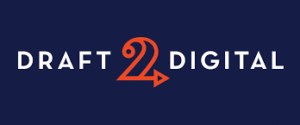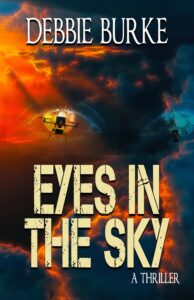
![]()
by Debbie Burke
When two people you like and respect join together in marriage, it’s cause for celebration. When two businesses you like and respect join together, it’s less romantic but still cause for celebration.
On February 4, 2026, Draft2Digital and Bookshop.org announced their new partnership. For indie authors and bookstores, this is worth popping a champagne cork.
Draft2Digital has been around since 2012 as a way to distribute ebooks to outlets including Barnes & Noble, Kobo, Apple, as well as numerous library sites. I first learned about them in 2016 at the Pikes Peak Writers Conference and have enjoyed using their services in the years since.
Indie authors who want to “go wide” (rather than stay exclusive with Amazon) have to upload their books manually to other sales outlets. That takes a lot of time as well as learning the particular quirks of each system.
D2D streamlines that process. Upload your book once to their easy-to-maneuver site. Their formatting templates are free to use and offer various genre styles that produce good looking books.
You then choose which sellers you want and D2D automatically distributes to them. Their formatting conforms to the individual requirements of each marketplace.
There’s no upfront cost to the author because they take a percentage from sales.
For someone tech challenged (like me!), this fits the bill. I’m more than willing to give up 10% of royalties to have D2D do the heavy lifting. Their site is user friendly and their customer service is always responsive.
When D2D makes changes in terms, they are refreshingly transparent. They don’t make stealth alterations that sneak up later to bite the author in the butt (not pointing fingers here but you might guess who I’m referring to).
Bookshop.org was founded in 2020 by Andy Hunter to support independent bookstores under siege from a certain eight-billion-pound online gorilla. Bookshop.org donates a portion of profits to indie stores. To date, donations add up to more than $45 million.
Their self-described mission is:
A socially-conscious way to buy books online. We dedicate most of our profits to supporting local, independent bookstores, authors, and publications that cover books. We are preserving the profound cultural benefits of bookstores even when readers prefer the convenience of online shopping.
Increasingly I’m hearing backlash from readers and consumers in general who are disenchanted with monopolistic business practices by giant corporations. Many now refuse to buy from one particular gorilla. They prefer to support independent bookstores.
So how will this new partnership between Bookshop.org and D2D work?
Maggie Lynch, a respected colleague from the Authors Guild, summarizes the arrangement:
Bookshop.org pays royalties to the author, just like they do for print books. If you are doing this through D2D, the royalties are paid out for those ebooks to D2D who then take their percentage 10% of retail price and reimburse you with the remainder of your royalty.
In addition, 10% of all sales on Bookshop.org are added to an earnings pool that is evenly divided and distributed to independent bookstores every six months. They also have an affiliate option where they sell print books, and now ebooks, through their store. When they sell those books using the bookshop.org link the bookshop earns a 30% payment of the cover price on any sales generated from the link. NOTE: Authors can become affiliates as well but the payout is 10% instead of 30%.
Many small bookstores use Bookshop.org (I think they have 2,000 bookstores currently aligned). It is a way for brick and mortar stores to make money on the online sales, packaging, and distribution of both print and ebooks without having to invest in a website and all the sales, taxes, picking, packaging, and shipping costs for that online environment.
Thanks, Maggie! (Check out her 30+ books at this link)
The day after the announcement of the partnership, I received an email from D2D offering the option of distributing my books via Bookshop.org. The process was simple: one click to add all books at once, or each could be added individually. I clicked to add all books. Two days later, D2D sent confirmation emails that all books were up on Bookshop.org.
That illustrates how easy, responsive, and painless D2D makes it to do business with them.
As an indie author, I don’t plan to jump ship from the world’s largest bookstore because it accounts for most of my sales. But it’s good to have alternatives.
This link tells you how to add your books to Bookshop.org.
This link explains how to use D2D.
I like doing business with responsible, ethical companies like Bookshop.org and Draft2Digital. Their missions complement each other, supporting indie authors and independent bookstores.
 Happy to raise a glass to toast this partnership. May they enjoy many happy years together.
Happy to raise a glass to toast this partnership. May they enjoy many happy years together.
~~~
TKZers: do you use Draft2Digital to distribute your books? Are your books in Bookshop.org? Please share your experiences with each. Have they been positive, negative, or mixed?
~~~
Draft2Digital offers another easy-peasy tool: the universal book link (UBL). A single link shows various markets and library sites where books are available. Please click on covers to see UBLs to purchase books in the Tawny Lindholm Thriller series:





 Recently Draft2Digital (D2D) did a survey among authors, publishers, and others to determine how they felt about the use of AI and what authors would consider fair compensation for use of their work. D2D CEO Kris Austin kindly gave permission to quote from the survey results (full results at this
Recently Draft2Digital (D2D) did a survey among authors, publishers, and others to determine how they felt about the use of AI and what authors would consider fair compensation for use of their work. D2D CEO Kris Austin kindly gave permission to quote from the survey results (full results at this 

